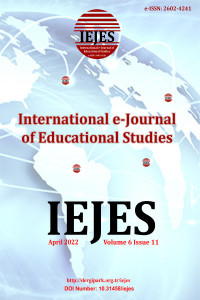The Difficulties of Theoretical and Applied Learning for Mathematics Subject in Primary Schools
Teaching mathematics, difficulties in mathematics, difficulties in learning
The Difficulties of Theoretical and Applied Learning for Mathematics Subject in Primary Schools
___
- Alshatri, S. H. H., Wakil, K., Jamal, K., & Bakhtyar, R. (2019). Teaching aids effectiveness in learning mathematics. International Journal of Educational Research Review. 4(3), 448-453.
- Breen, C. (2001). Coping with fear of mathematics in a group of preservice primary school teachers. Pythagoras, 54, 42-50.
- Breen, C. (2004). In the serpent's den: contrasting scripts relating to fear of mathematics. International Group for the Psychology of Mathematics Education. 2(1), 167–174.
- Churchill, R. V. (1944). Modern operational mathematics in engineering. Mathematical Physics and Mathematics.
- Geary, D. C. (2004). Mathematics and learning disabilities. Journal of Learning Disabilities, 37(1), 4-15.
- Graham, L., Bellert, A., Thomas, J., & Pegg, J. (2007). QuickSmart: A basic academic skills intervention for middle school students with learning difficulties. Journal of Learning Disabilities, 40(5), 410-419.
- Mazzocco, M. M., & Myers, G. F. (2003). Complexities in identifying and defining mathematics learning disability in the primary school-age years. Annals of dyslexia, 53(1), 218-253.
- Mohammed, G. S., Wakil, K., & Nawroly, S. S. (2018). The effectiveness of microlearning to improve students’ learning ability. 3(3), 32-38.
- Mundia, L. (2017). The assessment of math learning difficulties in a primary grade-4 child with high support needs: Mixed methods approach. International Electronic Journal of Elementary Education, 4(2), 347-366.
- Nawzad, L., Rahim, D., & Said, K. W. (2018). The effectiveness of technology for improving the teaching of natural science subjects. Indonesian Journal of Curriculum and Educational Technology Studies, 6(1), 15-21.
- Salihu, L., Aro, M., & Rasanen, P. (2018). Children with learning difficulties in mathematics: Relating mathematics skills and reading comprehension. Issues in Educational Research, 28(4), 1024.
- Skemp, R. R. (2012). The psychology of learning mathematics: Expanded American edition: Routledge.
- Tall, D., & Vinner, S. (1981). Concept image and concept definition in mathematics with particular reference to limits and continuity. Educational Studies in Mathematics, 12(2), 151-169.
- Tyson, L. (1924). Mathematics and medicine. Journal of the American Medical Association, 83(24), 1941-1941.
- Van Steenbrugge, H., Valcke, M., & Desoete, A. (2010). Mathematics learning difficulties in primary education: teachers’ professional knowledge and the use of commercially available learning packages. Educational Studies, 36(1), 59-71.
- Wakil, K., Khdir, S., Sabir, L., & Nawzad, L. (2019). Student ability for learning computer programming languages in primary schools. International e-Journal of Educational Studies (IEJES), 3(6), 109-115. doi:10.31458/iejes.531830
- Wakil, K., Muhamad, D., Sardar, K., & Jalal, S. (2017). The impact of teaching ict for developing education systems. International Journal of Advanced Research (IJAR), 5(7), 873-879. doi:10.21474/IJAR01/4793
- Wakil, K., Nasraddin, R., & Abdulrahan, R. (2018). The role of social media on students GPA. Indonesian Journal of Curriculum and Educational Technology Studies, 6(1), 1-5.
- Wakil, K., Omer, S., & Omer, B. (2017). Impact of Computer Games on Students GPA. European Journal of Education Studies.
- Wakil, K., Qaisar, N., & Mohammed, C. (2017). Enriching classrooms with technology in the basic schools. European Journal of Open Education and E-learning Studies. 2(1), 99-108.
- Wakil, K., Rahman, R., Hasan, D., Mahmood, P., & Jalal, T. (2019). Phenomenon-based learning for teaching ict subject through other subjects in primary schools. Journal of Computer and Education Research, 7 (13), 205-212.
- Başlangıç: 2017
- Yayıncı: Tamer KUTLUCA
Student Ability for Learning Computer Programming Languages in Primary Schools
Karzan WAKIL, Shanaz KHDIR, Lava SABIR, Lezan NAWZAD
Relationship between Emotional Intelligence and Exam Anxiety of Higher Secondary Students
The Effect of Reward and Job Satisfaction toward Turnover Intention Private Junior High School
Hardianto HARDİANTO, Rugaiyah RUGAIYAH, Unifah ROSYIDI
Lecturer Resource Development Management at STKIP Bina Bangsa Getsempena Banda Aceh
İsthifa KEMAL, Suryadi SURYADI, Unifah ROSYIDI
Diyan Riski PERMATAHATI, Muhammad Nur WANGID
The Difficulties of Theoretical and Applied Learning for Mathematics Subject in Primary Schools
Shwan H. H. ALSHATRI, Karzan WAKIL, Ribwar BAKHTYAR
Effectiveness of Double Entry Journals Strategies Learning to Write Text Description
